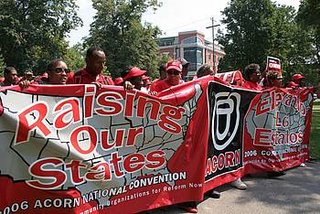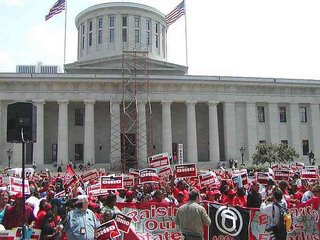
This is a New York Times Magazine article about the community activist group, ACORN, and their efforts to create ballot initiatives for minimum wage increases on the state and city level. They actually also work on living wage campaigns, which are efforts to change the wages of a certain type of worker, but not necessarily the lowest-paid people in the workforce. What is happening in Chicago is a great example of a fight for a living wage. They do not want to change the city's minimum, but are instead fighting to set a mandate for how much big companies like Wal-Mart have to pay their workers.
This article informs us that the minimum wage prior to the 1997 increase was $4.25, and that a grass-roots group composed of religious communities and labor unions got the City Council of Baltimore to raise the wage of the city's contract workers from the current minimum in 1995 to $6.10. This was in response to those with full-time jobs attending the city's soup kitchens and essentially living in poverty while still holding full-time jobs. This relates back to the first article I introduced, which showed that having a full-time minimum wage job has never been enough to raise someone out of poverty.
The ACORN group touts 134 living wage campaign victories, a huge number considering its humble beginnings. This reminds me of the readings we have done in class on the Civil Rights Movement, and actually makes me feel hopeful about making a difference. This hope has been lowered, though, with all of our conversations about political apathy and inactivity in our generation. Unfortunately, the generation working for ACORN and struggling for a wage that rises with living costs is probably not made up of middle-to-upper class undergrads, the very people currently plagued with inaction. It also doesn't help that the number of people directly affected by the minimum wage has been falling in recent years, as shown in the following diagram.

The article raises the interesting point that economic justice should come in a sweeping movement from Washington, yet has taken the form of low-level collectivity and community, solving the problem from the bottom up. This may not be conventional, but it is one of the only ways a difference has been made in recent history, and hopefully the grassroots nature [and success] of this campaign is a sign that it might be going somewhere.
This is an issue that Democrats hope to use as a new point of moral unification in the party. ACORN workers also hope that raising awareness and support for this issue will boost turnout for candidates who support it. They hope that the alarming moral concern will arise from the gap between rich and poor that exists in the U.S., something everyone can recognize. It is really fascinating that the article brings up Clinton's motivation for changing the minimum wage in 1997, and that was due to poll results showing that America was largely in favor of an increase. Our current administration could learn a bit from that.
The issue of a living wage has been around since the 19th century, according to this article, which also says that Massachusetts enacted a minimum wage of .25¢ in 1912, decades before the federal government enacted theirs. ACORN is not the only group attempting to revive this issue--the National Council of Churches and Industrial Areas Foundation are getting involved. It is interesting that this is viewed as a point of party disparity when the religious groups are getting entangled, as religion and government usually coincide more on the Republican side.
Those in opposition may not be Republicans, but there are certainly some economists on that side. Keynesian economists who believe in a strong government role in fiscal policy would support the minimum wage, but others believe that the market should be left to set wages, not policy. The argument on this side is that forced wages crowd teenagers, low-wage employees, and small businesses out of the market. However, specific research and case studies have since been done to prove this theory wrong and made converts out of many economists. The Economic Policy Institute now endorses wage regulations, and the CEO of Wal-Mart even recently spoke in favor of increasing the minimum wage. He does not pay his workers the minimum, though, and wouldn't be negatively affected by this increase--he may even see a boost in business due to the increased consumption by Wal-Mart's low-class shoppers.

Unemployment may arise in Santa Fe, however, due to the ordinance's provision that stores with under 25 employees do not have to pay the minimum wage, which provides an incentive to hire fewer workers. The article cites the example of Great Britain, who raised their minimum wage and actually experienced lower unemployment. Another concern brought up here is the ripple effect on wages within a business--if lower level employees are getting a pay increase, businesses may raise the wage of higher-level employees to maintain seniority in the workplace.
I talked in an earlier entry about the issue of inaction and apathy in my generation. I think that the strong human-interest aspect and moral spin of the minimum wage topic will have more of an affect on people than lumping it with other economic issues such as health care and retirement. Unfortunately, younger people aren't paying very much attention to these issues--they appear rather dry. Garnering moral support may be a more effective way of getting peoples' attention. My generation has other issues that come into play here, things we have talked about in class. The article "Bowling Alone" talks about our declining social capital and the parallel of a decline in time spent with family. Experiments done since the implementation of No Child Left Behind have shown that kids who spend more time talking to their parents absorb more information and learn things faster. If so many parents are working for low wages and working extreme hours to make ends meet, they are not taking time out to talk to their kids. Decreasing poverty is the key to solving a lot of other problems that plague the U.S.
That said, it concerns me that they want to set the wages so high in Sante Fe. Increasing to $10.50 by 2008 seems like a bit much. The article raises the possibility that ACORN is setting high wages to gain public support in their campaigning, but it seems like that support would be cancelled out by the lack of support from the government--it is very likely that they aren't taking this issue seriously because they find that kind of increase preposterous.
The article does go a good job of showing that all states react differently to wage increases, and whatever economists assume will happen is not necessarily going to be the case. While a federal consensus may seem like the right way for our country to set economic policy, it might make more sense to operate on a state-by-state basis. Some things might really be better off left to the state, as they do vary so much. With Robert Putnam's article in mind, perhaps this issue is exactly what state and city councils need to rally together and get that civic engagement back to a healthy level.
